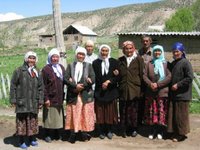Kyrgyzstan: land of the Kirghiz, ethnic name from Turkish kir: steppe, gis: nomad
The earliest ancestors of the Kyrgyz people, who are believed to be of mixed Mongol and Kipchak descent, probably settled until the 10th century around what is now the Tuva region of the Russian Federation. With the rise of the Mongol Empire in the 13th century, the Kyrgyz migrated south. They did not emerge as a distinct ethnic group until the 15th century. Islam is the predominant religion in the region, and most of the Kyrgyz are Sunni Muslims of the Hanafi school.

The territory was formally incorporated into the Russian Empire in 1876. The Russian takeover instigated numerous revolts against tsarist authority, and many of the Kyrgyz opted to move to the Pamirs and Afghanistan. In addition, the suppression of the 1916 rebellion in Central Asia caused many Kyrgyz to migrate to China.
The Kyrgyz language replaced Russian as the official language in
 September 1991. (Kyrgyz is a member of the Southern Turkic group of languages and was written in the Arabic alphabet until the 20th century. Latin script was introduced and adopted in 1928, and was subsequently replaced by Cyrillic in 1941.)
September 1991. (Kyrgyz is a member of the Southern Turkic group of languages and was written in the Arabic alphabet until the 20th century. Latin script was introduced and adopted in 1928, and was subsequently replaced by Cyrillic in 1941.)The Tulip Revolution after the parliamentary elections in March 2005 forced President Akayev's resignation on April 4, 2005. Opposition leaders formed a coalition and a new government was formed under President Kurmanbek Bakiyev and Prime Minister Feliks Kulov.

Political stability appears to be elusive, however, as various groups and factions allegedly linked to organised crime jockey for power. Three of the 75 members of Parliament elected in March 2005 have been assassinated since then, and another member was assassinated on 10 May 2006 shortly after winning his murdered brother's seat in a by-election. All four are reputed to have been directly involved in major illegal business ventures.

2 comments:
The tulip revolution???? I thought tulips were synonimous with the clog wearing windmill living dutch? I've heard of the rose report but i think you're going too far with this one. Making up a country's history, on a whim, to make it sound more exciting is just plain daft! Just look at the Americans!
Rose Revolution: Georgia, 2003.
Orange Revolution: Ukraine, 2004.
Tulip Revolution: Kyrgyzstan, 2005.
Cedar Revolution: Lebanon, 2006.
Slow Revolution: your thought process, annually.
Agree about the American bit though.
Tulip Revolution here:
http://en.wikipedia.org/wiki/Tulip_revolution
Post a Comment